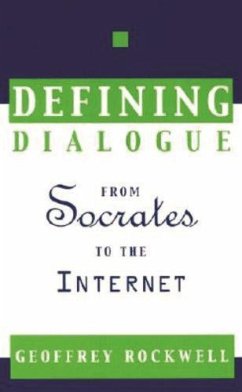This original cross-disciplinary work examines the crucial role of dialogue in philosophy from the oral dialogues of Socrates; through the written dialogues of Plato, Cicero, Lucian, Valla, Hume, and Heidegger; to the present ubiquitous form of dialogue on the Internet. Geoffrey Rockwell's main point is that in dialogue, be it oral, written, or electronic, there is a common mode of persuasion at work. The dialogue is an orchestrated event meant to be overheard. While the author is absent, the readers of the dialogue are in a sense present as eavesdroppers on a conversation scripted to encourage them to judge between the characters and the philosophical positions they represent. Relying heavily on Italian Renaissance theories of dialogue, Rockwell builds on Sperone Speroni's comparison of dialogue to comedy in which there is a mixture of voices, each with its own form and content. He then looks to the essays of M. M. Bakhtin to propose a working definition of dialogue as a unity of diverse voices. Dialogue is many things, but it is principally about the culture of thoughtful conversation. It is a genre suited to presenting how people discuss ideas, how positions are related to character, and surveying positions that can be taken on a subject. In a world increasingly connected by the Internet, there is no more appropriate genre for study.
Hinweis: Dieser Artikel kann nur an eine deutsche Lieferadresse ausgeliefert werden.
Hinweis: Dieser Artikel kann nur an eine deutsche Lieferadresse ausgeliefert werden.








